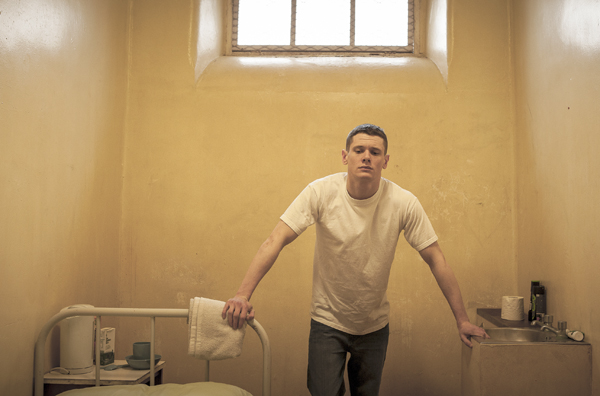Starred Up, written by real-life prison psychiatrist Jonathan Asser, feels like necessary corrective medicine for our cultural obsession with anti-heroes. Morally repugnant protagonists have never been more popular, but their appeal is in seeing them out in the world, evading capture, living dangerous, exciting lives, and daring the world to stop them. When you put someone like that inside a cage, you see them for what they are—desperate, empty, pathetic, and dull. Criminality has rarely been dramatized in so unromantic a way as it is here.
The prison drama follows 19-year-old Eric Love (Jack O’Connell), a rabid pit-bull of a person so vicious that he is “starred up” from juvenile status to adult status, and he quickly establishes himself as one of the more dangerous people even in that environment. There’s something compelling about watching Eric, cornered in a small room, take on an entire group of guards by himself, fully convinced that he will be able to plow through them.
Eric does not comprehend that he can’t punch himself out of trouble, only into it. He uses every means at his limited disposal to gain an upper hand in his impossible situation, never giving up the fight, and his depraved resourcefulness is something to watch. The fight is never, ever over, and defeat is never admitted. The realistic, bare-bones depiction of ultra-violent behavior is a main attraction, though not the only one. There’s a shower attack scene that somehow outdoes the famous shower fight scene from Eastern Promises by being less ostentatiously choreographed and more unnervingly claustrophobic.
Additionally, Eric’s father, Neville (Ben Mendelsohn), is locked up in the same grisly prison with his son. They have been estranged since Eric was five, and Neville is a true prison lifer, irreversibly hardened by years of doing anything to survive the bleakest possible circumstances. Mendelsohn has made a name for himself playing lowlifes in supporting roles Killing Them Softly and The Place Beyond the Pines, but here he takes center stage and is more menacing than ever.
This is very much a piece of stripped down, raw filmmaking. Like in this year’s Blue Ruin, we get a sense of place through various well-observed minor tactile details that go along with daily prison life, as Blue Ruin did for the experience of contemporary homelessness. Eking out any kind of survival in prison is a grueling, wall-to-wall hustle, where every moment of ease is hard-won, and the filmmakers establish that reality quite effectively.
Eric attends anger management sessions with a group of fellow dangerous convicts, led by volunteer counselor Oliver Baumer (Rupert Friend of TV’s Homeland). These sessions may be a bit tedious to sit through, depending on your tolerance for watching dead-eyed, monosyllabic tough guys muttering insults at each other in barely decipherable British slang. But eventually, Eric shows signs of being able to have decent, positive human interactions. Even something as minor as thanking someone for giving him a cup of tea is a major breakthrough.
Eric and Neville butt heads in almost all of their scenes, as Eric is too deeply scarred by a lifetime of neglect to see his father as anything other than a despicable creep. Neville tries to reach out to his son and do what he thinks a father should do, but it’s largely too little too late. When Eric begins suspecting that his father has a prison boyfriend, as one is wont to do after decades inside, their relationship becomes shockingly violent. Homosexuality somehow manages to make Eric angrier than ever, which didn’t seem possible.
There isn’t much of a narrative arc, as the film is too realistic and cynical to suggest that these men can become anything other than what they are. But we are shown that this isn’t entirely the fault of the criminals, either. Deputy Governor Hayes (Sam Spruell), the head authority figure in the prison, cannot see Eric as anything other than like the raging animal he was when he came in, and he makes it nearly impossible for Oliver to help Eric stifle his psychotically violent impulses.
Neville’s guilt for being a terrible father continues to motivate him to earn his son’s trust and respect. Toward the end, Hayes’s hatred for Eric reaches a breaking point, and Neville has a chance to do something that, in a bleak setting like this, passes for heroic. Though the film can feel like an endless series of ugly violence followed by inert dullness, there is a measure of redemption that makes Starred Up worth the trip.

















Leave A Comment